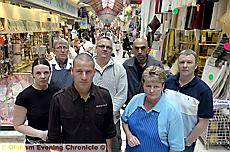Traders: ‘we will lose a fortune’
Reporter: by JENNIFER HOLLAMBY
Date published: 15 July 2008

Tommyfield Market traders worried about council strike affecting their businesses. Left to right, Jacqueline Schofield, David Ashworth, Justin Brierley, Philip Armitage, Abid Mahmood, Beverley Buckley, Paul Hepworth.
INCENSED traders say they will lose a fortune when the markets are forced to close during council workers’ strike action this week.
Stallholders were told that the markets will be closedtomorrow and Thursday on health and safety grounds because council cleaners — members of Unison — will not be working.
But furious traders insist they can clean up their own rubbish and question why they have to lose two days of business when markets in surrounding boroughs remain open.
Leading the chorus of complaint is Justin Brierley, who runs footwear stalls in the Tommyfield, Shaw and Royton markets.
He said: “A lot of stallholders stand to lose an awful lot of money. In the current economic climate, the council should be trying to help us, not hinder us.
“I am set to lose out three times over because I run more than one stall and it’s difficult to put a figure on it, but it’s going to be a significant amount.”
The closures will affect all markets, including Royton, Shaw and Uppermill, with only the shops on Albion Street and Curzon street remaining open.
The traders were told about the closures in a letter and say that each time they have tried to contact council officials they have been fobbed off.
Mr Brierley added: “As far as we know, management and security are still working, so there’s only the issue of the cleaning, but we’re all business people and more than capable of cleaning up any spillages.
“A group of us have already volunteered to stay behind and get everything cleared up, but we have not been given chance to discuss this with the council.”
Cabinet member for Environment and Infrastructure Councillor Mark Alcock said: “We are meeting with traders representatives later today to explain further why we cannot open.
“As we cannot guarantee the levels of staffing on strike days we cannot be sure we can cover any health and safety issues.
“As to other markets allegedly opening in other boroughs, that is a matter for each local service and will depend on such factors as the numbers of union members in the local service. This means that it is not possible to make direct comparisons.”
Most Viewed News Stories
- 1Pair sentenced for firearms offences in Oldham
- 2Unsafe fake Labubu dolls seized by Oldham Trading Standards
- 3Council chopped down trees 10 months ago, but the cuttings still remain
- 4Royton friends set to take on 90-mile charity walk in memory of popular local dad
- 5Police discover cannabis farm in St Mary's




